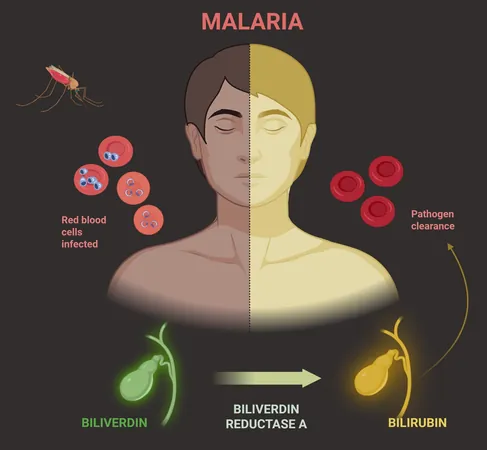
Bilirubin: The Unexpected Protector Against Malaria and Infectious Diseases!
2025-06-12
Author: Jia
Bilirubin's Surprising Role in Health
In a groundbreaking discovery, scientists have unveiled a remarkable new function of bilirubin, the natural yellow pigment that many associate with jaundice. Recent research suggests that this pigment might protect humans from the severe impacts of malaria and possibly other infectious diseases. This exciting finding could revolutionize drug development by mimicking bilirubin's effects or enhancing its presence in the body, providing a new line of defense against devastating infections.
Malaria: A Global Threat
Malaria, an illness transmitted by mosquito bites, presents a grave health crisis, affecting over 260 million individuals annually, particularly in tropical regions. Tragically, it claims approximately 600,000 lives each year, highlighting the urgent need for effective treatments and preventative measures.
The Groundbreaking Study
Published in the esteemed journal Science, this research is a collaborative effort between Miguel Soares, Ph.D., at the Gulbenkian Institute in Portugal and Bindu Paul, Ph.D., from Johns Hopkins Medicine. Building on prior findings regarding bilirubin’s role in brain protection, this study sheds new light on its potential advantages against malaria.
Bilirubin's Protective Potential?
According to Paul, the research indicates that increasing bilirubin production could serve as a vital strategy in preventing the most dangerous outcomes of malaria. While bilirubin is routinely measured in blood tests, its broader roles within the body remain largely uncharted territory.
The Link Between Bilirubin and Infectious Diseases
Doctoral researcher Ana Figueiredo, involved in this pivotal study, posits that bilirubin might extend its protective properties beyond malaria, offering a shield against various infectious diseases.
Discovering the Connection
Paul’s earlier work in 2019 had initially linked bilirubin to brain cell protection from oxidative damage. Although some studies indicated a correlation between bilirubin and malaria, the specific impact of the pigment on disease progression remained ambiguous until now.
The Experimental Breakthrough
To unravel bilirubin's role, scientists collaborated with institutions in Berlin and Gabon, analyzing blood samples from 42 malaria patients infected with P. falciparum, the most lethal malaria strain. They discovered that those with asymptomatic malaria had ten times more unprocessed bilirubin in their blood than those with symptoms. This suggests that bilirubin accumulation might play a protective role.
Mouse Model Findings
In further experiments, researchers utilized mouse models to assess the effects of bilirubin on malaria. Normal mice exhibited increased bilirubin levels after infection and all survived the ordeal. However, genetically altered mice lacking BVRA—a key protein in bilirubin production—suffered devastating outcomes, with all succumbing to the infection.
The Protective Power of Bilirubin
Intriguingly, when researchers administered bilirubin to the BVRA-deficient mice, their survival rates improved significantly, mirroring those of their healthy counterparts. This underscores bilirubin's potential as a powerful therapeutic agent.
Future Research Directions
As Paul continues to investigate bilirubin's protective capabilities, she emphasizes its reevaluation from mere waste product to a potential therapeutic hero against infectious and neurological diseases. The implications of these findings could extend far beyond malaria, offering new avenues for treatment and prevention in the fight against severe illnesses.





 Brasil (PT)
Brasil (PT)
 Canada (EN)
Canada (EN)
 Chile (ES)
Chile (ES)
 Česko (CS)
Česko (CS)
 대한민국 (KO)
대한민국 (KO)
 España (ES)
España (ES)
 France (FR)
France (FR)
 Hong Kong (EN)
Hong Kong (EN)
 Italia (IT)
Italia (IT)
 日本 (JA)
日本 (JA)
 Magyarország (HU)
Magyarország (HU)
 Norge (NO)
Norge (NO)
 Polska (PL)
Polska (PL)
 Schweiz (DE)
Schweiz (DE)
 Singapore (EN)
Singapore (EN)
 Sverige (SV)
Sverige (SV)
 Suomi (FI)
Suomi (FI)
 Türkiye (TR)
Türkiye (TR)
 الإمارات العربية المتحدة (AR)
الإمارات العربية المتحدة (AR)